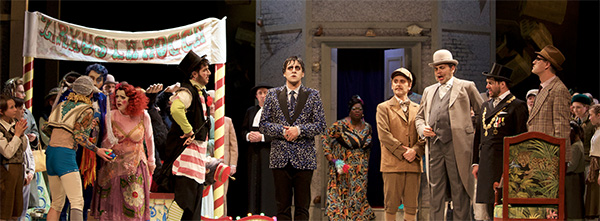by Parker Ramsay
For those of us keeping track, June has been an eventful month for American opera. Premieres of Anthony Davis’ The Central Park Five (Long Beach Opera) and Ian Bell’s Stonewall (New York City Opera) placed narratives of society’s dispossessed front and center on opera stages on both coasts. So too has a lost opera found a rebirth: directed by Yuval Sharon, Meredith Monk’s Atlas moved audiences in a production by Los Angeles-based Industry Opera at Walt Disney Concert Hall.
Meanwhile at the Gärtnerplatztheater in Munich, I had the welcome surprise of seeing an opera which incorporates experiences of racial prejudice and homophobia at the same time. Composed in 1965, Hans Werner Henze’s Der Junge Lord tells the story of Lord Edgar, a secretive English aristocrat who settles in Willhelmine, Germany, and soon finds himself under suspicion of homosexuality, child abuse, and the general social transgression of socializing with friends of African descent (two roles are specifically cast for persons of color).
After his house is vandalized, and his friends are accosted and assaulted in the streets, Lord Edgar agrees to relinquish his privacy and allow the townsfolk into his home to meet his son (“The Young Lord”). But as the town gathers, it is soon revealed that Lord Edgar’s heir is no potential suitor for the town’s middle-class daughters, but rather an ape from the local circus, masquerading in human clothes.
The opera invites a production which highlights explicit social tensions, as the townsfolk plainly shame Lord Edgar for keeping the company of Schwarzen. There is no subtlety about how the town refers to him and his translator’s “effeminate” features and dress. In addition, the music is fantastic and akin to the more effective scenes in Britten’s The Turn of the Screw. (In fact, Henze uses the same instrumentation to allude to sexuality: a celesta complemented by string harmonics and high-pitched percussion.)
Der Junge Lord has not received a performance in the United States since 1973. We have at our fingertips a musically viable opera by an important composer which explicitly addresses racism and homophobia. Why isn’t it in the American canon?
From what I can tell, there are several possibilities. I would personally rule out the composer’s public profile in the 1960s and 1970s. By the time Der Junge Lord was performed in New York, Henze had already fled to Cuba (inspiring another of his politically radical operas, El Cimarrón), performed on either side of the Iron Curtain, and even made public statements praising China’s Cultural Revolution. None of this was too extreme for the New York City Opera, whose performances went relatively unnoticed from a political standpoint (the two critics who wrote about it apparently despised the music too much to comment on the opera’s plot or message).
Similarly, I find it hard to believe that the issue of sexuality in the opera would keep it under wraps for so long. From Lou Harrison’s Young Caesar to Nico Muhly’s Two Boys, gay opera and gay opera composers have not posed too great a threat to audience expectations (and after all, gay men constitute a significant portion of American opera audiences).
So what gives? My hypothesis is that the material might be too close to home for American audiences. We happily watch historical heroes attempt to overthrow their slave-masters in El Cimarrón, just as we’re happy to see a love story between Caesar and his older lover in Young Caesar. In titles like these, the figures are so much larger than life that we can arguably divorce ourselves from the situations on stage.
This is not the case with Der Junge Lord. There is no redemptive ending, or heroism, or moment of overcoming as we would normally expect from radical art that transcends racial and sexual boundaries. The victory is sinister, as the townsfolk essentially reveal to themselves that their own middle-class values have blinded them. They mimic the upper classes and fail to see the false principles on which their values are built. In essence, it’s not that the gay and black characters on stage are “right” or vindicated — it’s simply that the bourgeoisie can’t tell sh*t from Shinola.
Der Junge Lord contains explicit Brechtian qualities, using humor and polemics to make the audience as uncomfortable as possible (even to the point where one realizes that homophobia and racism are narrative props, rather than substantive foci). In many ways, it’s reminiscent of Brecht’s The Resistible Rise of Arturo Ui, which contains no redeeming, authentic characters — as a despotic crook rises to rule a Midwestern city, it’s up to your conscience to fill in the moral blanks.
To be honest, operas that would be so bold as to confront a capitalist class system as a whole are probably too much to bear for an American operatic industry that continues to rely on private dollars and middle-class values of meritocratic ascendancy to promote itself. Our young artist programs continue to exploit young singers to cut costs, our opera houses continue to cover up years of sexual misconduct, and most major opera houses continue to conform to ethnocentric canonic standards.
But all is not lost. Revelations about cover-ups at houses like the Metropolitan Opera, or with figures such as David Daniels, show that while no “solution” is immediately in sight for justice or restitution, the joke is ultimately on opera promoters and organizations that continue to pander to donors for good will. Stonewall and The Central Park Five are testing the waters, but perhaps this time is as good as any for an American revival of Der Junge Lord.
Published on ClevelandClassical.com July 9, 2019.
Click here for a printable copy of this article




